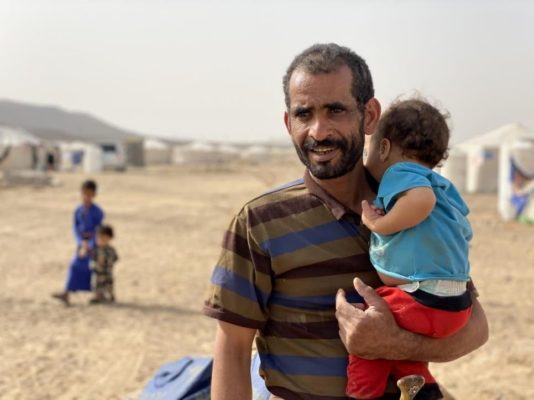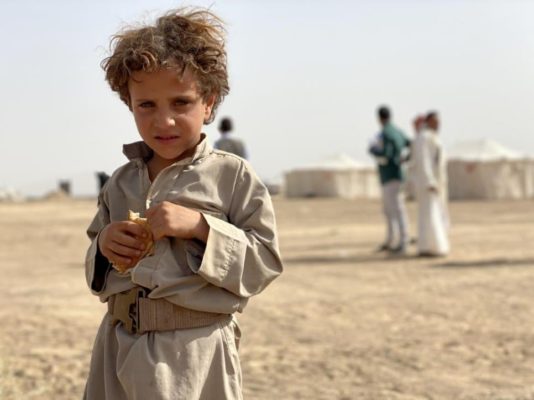
Said, an internally displaced Yemeni, collects recyclables in Aden. © UNHCR/Marie-Joëlle Jean-Charles
After losing his home and business in Yemen’s conflict, Said is among 90 displaced recyclers whose earnings have doubled after receiving new tricycles from UNHCR.
By Marie-Joelle Jean-Charles in Aden, Yemen
Said pedals his bright red tricycle through the dusty back streets of Aden in southern Yemen, scanning the roadside as he goes. Spotting something, he dismounts and spends several minutes disentangling a mass of discarded chain-link fencing from blocks of concrete, before loading it into the large basket suspended above his two front wheels.
After spending 12 hours collecting metal and plastic waste, Said delivers his hauls to recycling industry wholesalers in the city in exchange for the equivalent of around US$4 each day.
It may seem a small sum for the time and effort involved, but having been forced to abandon his former business and displaced from his home due to Yemen’s five-year conflict, the money he earns makes all the difference to Said and his family.
“I lost everything when the fighting broke out. The war took everything,” explained Said, who fled with his wife and seven children from their home in Al Hudaydah on the country’s west coast in 2018 after a wave of violence swept the area.
They went from living a comfortable life supported by Said’s successful business making and selling traditional ornate floor cushions known as madkha, to fleeing with nothing to join the estimated 3.65 million Yemenis displaced by the long-running conflict.
“The war took everything.”
Globally, more than 41 million people are currently displaced inside their own countries. Today (17 April) marks the 22nd anniversary of the adoption of the Guiding Principles on Internal Displacement, the first international standards for internally displaced people that set out their rights and governments’ obligations towards them.
“We first went to Sana’a, but after spending some time there, life was hard. I could not find support or a job,” Said said. At the end of last year, the family made their way to the southern port city of Aden, where they found space in a collective shelter living alongside 135 other families displaced from various parts of the country.
On arrival, UNHCR, the UN Refugee Agency, and its partners provided them with essentials including a tent and mattresses. But with no means of earning an income, it was a struggle for Said just to keep his family fed, so he began collecting waste metal and plastic by hand simply to survive.
After five years of conflict, Yemen’s economy has contracted by almost 50 percent and is on the point of collapse. Only half of the country’s health facilities remain operational, more than a quarter of children are currently out of school, and over 80 percent of the population have fallen below the poverty line.
This combination of factors has placed huge pressure on the already critically underfunded humanitarian response.
To address the dire need for livelihood opportunities, particularly among the displaced population, UNHCR launched a project in Aden to provide tricycles at a cost of US$435 each as well as protective gear to those already engaged in collecting recyclable materials in the city.
Said was one of the first to receive the equipment in the project’s pilot phase, and his feedback helped lead to improvements in the tricycle’s design to make them more durable, and better suited to the task of transporting materials across the rugged local terrain.
With more than 200 people now having received the new equipment from UNHCR, not only has it improved the safety and dignity of their working conditions, but it has also led to a doubling of their average monthly income from 60,000 to 120,000 Yemeni rials (US$105 to 210).
“I was able to improve my life.”
“At the end of the day, I make […] enough to feed my family and pay for small expenses,” Said explained. “With the tricycle, in just a little over two months I was able to improve my life.”
The prospect of a further improvement came when Said was told he would receive a one-off cash assistance payment from UNHCR of 100,000 rials (US$175). With the income from recycling enough to cover the family’s basic needs, he decided to invest the extra money in the materials he needed to begin making madkhas again.
By gradually building up his old business when not out recycling, Said’s ultimate aim is to earn enough extra income to find a better home for his family, and send his children back to school.
“I know I can restart my business here and make enough to support my family,” he said. “I wish for my kids to be able to go to school to improve their life. I wish for all to live in health and peace and I trust that with the tricycle, my will, and God’s help, I can start again and make a better life for us.”
You can make a donation here to help families in Yemen facing a humanitarian catastrophe.
Originally published by UNHCR on 17 April 2020




